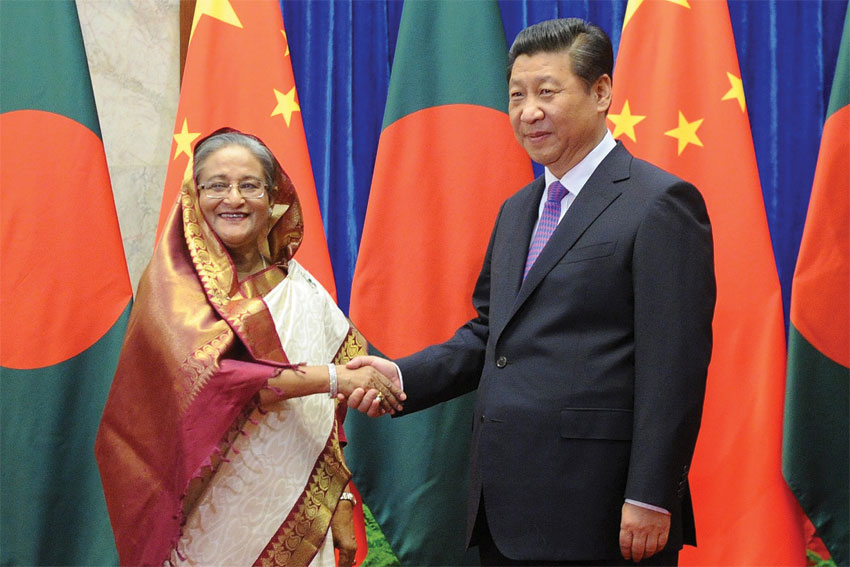Although Bangladesh and China have interacted for millennia, this year marks the 40th anniversary of the formal establishment of diplomatic relations between the two countries

During modern times, Bangladesh-China relations have largely been dominated by economic and trade cooperation. Within the framework of a vital cooperation agreement, Bangladesh and China are working to create sustainable institutional architectures for accelerating social and economic development, mitigating the effects of natural disasters and adverse impacts of climate change, safe guarding the environment, boosting human capital, developing vital infrastructure and expanding commercial and trading relations.
Under the leadership of Prime Minister Sheikh Hasina, relations have dramatically expanded and reached to a newer height to touch on almost all aspects of modern life.
This achievement was largely made possible by the ratification of the historic “Closer Comprehensive Partnership of Cooperation Agreement”, signed during the visit of Prime Minister Sheikh Hasina to Beijing in March, 2010. This historic agreement has laid the groundwork for an all-encompassing bilateral relations strategy. The vision of this agreement was further developed during the official visit by Prime Minister Sheikh Hasina to China in June, 2014. This event has since been recognized as one of most important landmarks in the development of Bangladesh-China bilateral relations.
The Comprehensive Partnership of Cooperation Agreement
The cooperation framework was created from a strategic perspective, based on longstanding friendship, equality, and mutual benefit. Core points have seen both sides commit to the following goals: growing regional, international and multilateral cooperation, collaborating on natural resource management and natural disaster reduction, intensifying knowledge exchange, and enhanced economic and infrastructure development.
Joint regional and multilateral cooperation has been focused on encouraging peace, stability and respect for sovereignty – an issue close to the hearts of both Bangladeshis and Chinese alike. It includes a closer cooperation on the international stage, including the United Nations, with recognized joint interests in addressing climate change and the post-2015 development agenda. Furthermore both sides have pledged to play a constructive role in deepening regional peace and progress in South Asia, utilizing the framework of the South Asian Association for Regional Cooperation (SAARC).
Collaboration in environmental and disaster reduction touches on the vulnerability of the region to climate change and the associated catastrophes it can generate, especially floods. Additionally the sustainable development of the blue economy and maritime resources is paramount to both countries’ food security and economic futures.
Intensified knowledge exchange will focus on developing commerce, education, science and health through people-to-people exchanges.
In line with this, enhanced economic exchange and infrastructure development have brought about the involvement of Chinese companies in developing communications, energy, transportation infrastructure and industry in Bangladesh. This includes critical installation and construction of roads, railways, bridges, and water treatment plants. A plethora of Memorandums of Understanding (MoU) has been signed to ensure the timely completion of these assets.
Economic development, trade and investment
China has become the largest trading partner of Bangladesh since 2007, with the movement of goods totaling $10 billion annually. Although small in comparison, exports to China from Bangladesh reached a value of $746 million in 2014, an increase of 85% from 2011. These were mainly generated from the sale of jute and jute goods, leather and leather products, Ready Made Garments, textile articles and fibre, fish, crustaceans, mollusks, aquatic invertebrates, plastics, raw hides and skins, vegetables, etc. Overall volumes have been boosted by a duty free access agreement in place since 2010.
The establishment of Chinese enterprises in the Bangladesh Export Processing Zone Authority (BEPZA) has generated significant employment and economic development. Currently, 75 Chinese enterprises are operating in these areas, having invested in excess of $ 657 million. Almost 78,000 jobs have been created for locals as a result.
Following the success of these enterprises, during the visit of Prime Minister Sheikh Hasina to China in June 2014, an MOU was signed to establish Special Industrial and Economic Zones (Chinese Economic and Industrial Zones - CEIZ) catering to Chinese investment. Bangladesh Economic Zone Authority (BEZA) allocated land for the proposed economic zone, which is situated in Anwara Upazila of Chittagong district on 774 acres of land. The Chinese Government nominated China Harbour Engineering Company Limited (CHECL) to work on their behalf for the establishment of the economic zone. Another Chinese company titled China National Machinery Import and Export Corporation (CMC) has shown interest to establish an economic zone at a different site in Anwara Upazila on 504 acres of land. The company is interested in developing the site following the G2G model. It also submitted a draft Memorandum of Understanding for formalizing the process.
The tempo of collaboration has not diminished. Currently, a total of 291 Chinese investment projects are in various stages of implementation approximately worth around $642 million. These offer the potential to create employment for 59,000 Bangladeshis.
Joint Venture agreements with China have resulted in remarkable economic development leading to increased fertilizer production, the introduction of 3G and expansion of 2.5G networks, other ICT infrastructure development and the construction of a vital water treatment plant.
China has made a substantial contribution to the power sector development of Bangladesh, which has also been created through joint ventures and direct investment. The effect of additional electricity generation on the other areas of the economy is also significant.
Wider prosperity is expected to take place following the development of the Bangladesh-China-India-Myanmar Economic Corridor (BCIM EC). Such a move would create an important vehicle to complement various regional connectivity initiatives.
0 COMMENTS